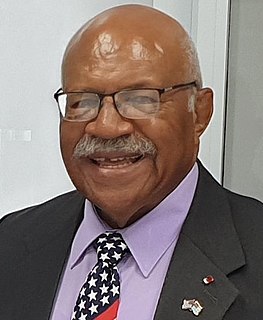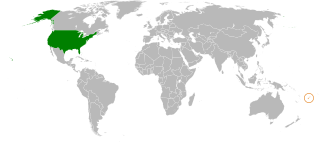
Mahendra Pal Chaudhry is a Fijian politician and the leader of the Fiji Labour Party. Following a historic election in which he defeated the long-time former leader, Sitiveni Rabuka, the former trade union leader became Fiji's first Indo-Fijian Prime Minister on 19 May 1999, but exactly one year later, on 19 May 2000 he and most of his Cabinet were taken hostage by coup leader George Speight, in the Fiji coup of 2000. Unable to exercise his duties, he and his ministers were sacked by President Ratu Sir Kamisese Mara on 27 May; Mara intended to assume emergency powers himself but was himself deposed by the military leader, Commodore Frank Bainimarama.

Laisenia Qarase was a Fijian politician. He served as the sixth Prime Minister of Fiji from 2000 to 2006. After the military quashed the coup that led to the removal of Mahendra Chaudhry, Qarase joined the Interim Military Government as a financial adviser on 9 June 2000, until his appointment as Prime Minister on 4 July. He won two parliamentary elections, but a military coup removed him from power on 5 December 2006. He was later imprisoned on corruption charges brought by the military-backed regime.

The prime minister of Fiji is the head of government of the Republic of Fiji. The prime minister is appointed by the president under the terms of the 2013 Constitution of Fiji. The prime minister is the head of the Cabinet and appoints and dismisses ministers.
Brigadier-General Ratu Epeli Ganilau, MC, MSD, is a former Fijian military officer and a retired politician. His career previously encompassed such roles as Commander of the Fiji Military Forces and Chairman of the Bose Levu Vakaturaga. On 15 January 2007 he was sworn in as Minister for Fijian Affairs in the interim Cabinet formed in the wake of the military coup which deposed the Qarase government on 5 December 2006.

Sitiveni Ligamamada Rabuka, OBE, MSD, OStJ, is a Fijian politician best known as the instigator of two military coups in 1987. He was later democratically elected as Prime Minister of Fiji, serving from 1992 to 1999. He went on to serve as Chairman of the Great Council of Chiefs, and later served as Chairman of the Cakaudrove Provincial Council from 2001 to 2008. He was elected to this position on 24 May 2001 and re-elected for another three-year term on 13 April 2005.

Josaia Voreqe "Frank" Bainimarama is the 8th and current prime minister of Fiji since 2007. A member of the Fiji First Party, he began his career as a naval officer and commander of the Fijian Military Forces.

Ratu Inoke Kubuabola is a Fijian politician and Cabinet Minister. He is the former leader of the opposition and Minister for Foreign Affairs.
Ratu Jope Naucabalavu Seniloli was a Fijian chief who held the title of Turaga Taukei Naua and who served as Fiji's vice-president from 25 March 2001 to 29 November 2004, when he was forced to resign following his conviction for treason on 6 August 2004, and the rejection of his appeal early in November.
Poseci Waqalevu Bune is a former Fijian politician, who has served as Deputy Leader of the Fiji Labour Party (FLP). From June to December 2006, he served as Minister for the Environment, one of nine FLP ministers, in the multiparty Cabinet of Prime Minister Laisenia Qarase. His ministerial career was terminated by the coup d'état that deposed the government on 5 December 2006, but on January 8, 2007, he was appointed as Minister for Public Service and Public Service Reform in the interim Cabinet of Commodore Frank Bainimarama.
Petero Mataca born at Cawaci, on Ovalau Island, served as the Roman Catholic archbishop of Suva, Fiji until his resignation in 2012.
Simione Kaitani is a former Fijian politician. He was previously a Cabinet Minister from 2001 to 2006, serving initially as Minister for Transport and Civil Aviation, and later as Information Minister. He resigned these portfolios in favour of Ratu Naiqama Lalabalavu on 20 September 2005, but remained in the Cabinet as a Minister without portfolio. Following the general election of 2006, he was appointed Leader of the House, and as such was responsible for the conduct of government business in the House of Representatives. He remained in this position until the military coup that overthrew the government on 5 December 2006.

The Reconciliation and Unity Commission was a proposed government body to be set up if the Reconciliation, Tolerance, and Unity Bill, which was introduced into the Fijian Parliament on 4 May 2005 was passed. The legislation proposed to empower the Commission to grant amnesty to perpetrators of the Fiji coup of 2000, and compensation to victims of it from 19 May 2000 through 15 March 2001. The Fijian President would retain a veto over the granting of amnesty.

Fiji–India relations refer to foreign relations between Fiji and India. Fiji has a high commission in New Delhi, whilst India has a high commission in Suva.
Andrew Charles Hughes was an Australian police officer of the Australian Federal Police (AFP) who served as the Chief Police Officer (CPO) for the Australian Capital Territory (ACT) and the Head of the United Nations Police Division. The CPO position is similar to the role of Australian Commissioners of Police, that is, the chief executive of the ACT Policing component of the AFP. ACT Policing forms one of the larger operating components of Australia's national policing agency, the Australian Federal Police. He was also Commissioner of Police in Fiji from 2003 to 2006. Hughes died of bowel cancer in 2018, aged 62.

The tension between Fiji's government and Military forces, which had been simmering for more than two years, appeared to escalate in late December 2005. Tension between the government and the Military had been simmering throughout the year, with Commodore Bainimarama and other Military officers making strongly worded public statements opposing certain government policies, including the early release from prison of persons implicated in the Fiji coup of 2000, and the government's promotion of controversial legislation to establish a Commission with the power to grant amnesty to perpetrators of the coup.

The Fijian coup d'état of December 2006 was a coup d'état carried out by Commodore Frank Bainimarama, Commander of the Republic of Fiji Military Forces, against the government of President Josefa Iloilo. Iloilo was removed as president, but he was later reinstated by Bainimarama on 4 January 2007. The coup occurred as a continuation of the pressure which had been building since the military unrest of the 2000 Fijian coup d'état and 2005–06 Fijian political crisis.

Fiji–United States relations are the bilateral relations between the Fiji and the United States. The relationship has improved significantly since Fiji's elections in September 2014, which restored a democratically elected government to Fiji for the first time since 2006. The United States had opposed Fiji's unelected government, which came to power through a military coup in December 2006.

Ratu Josefa Iloilovatu Uluivuda, CF, MBE, MSD, KStJ was a Fijian politician who served as the 3rd President of Fiji from 2000 until 2009, excluding a brief period from 5 December 2006 to 4 January 2007. He held the traditional title of Tui Vuda, the paramount chief of the Vuda district in Ba Province on Fiji's northwest coast. Like many Fijian people, he rarely used his surname and was known simply as Josefa Iloilo. He announced on 28 July 2009 that he would be leaving office on 30 July. At the age of 88, he was the world's oldest head of state.
Jale Baba in Lautoka is a Fijian businessman and political organizer. A forestry graduate of the Australian National University, he worked for Fiji Pine Limited for more than 20 years, before leaving in 1999 to start his own company- Baba Forests. He also serves as the campaign director of the ruling Soqosoqo Duavata ni Lewenivanua Party, or SDL). He was General Secretary and more recently National Director of the party, but relinquished this post on 1 January 2006 in order to take charge of the campaign for the general election to be held from 6–13 May.









